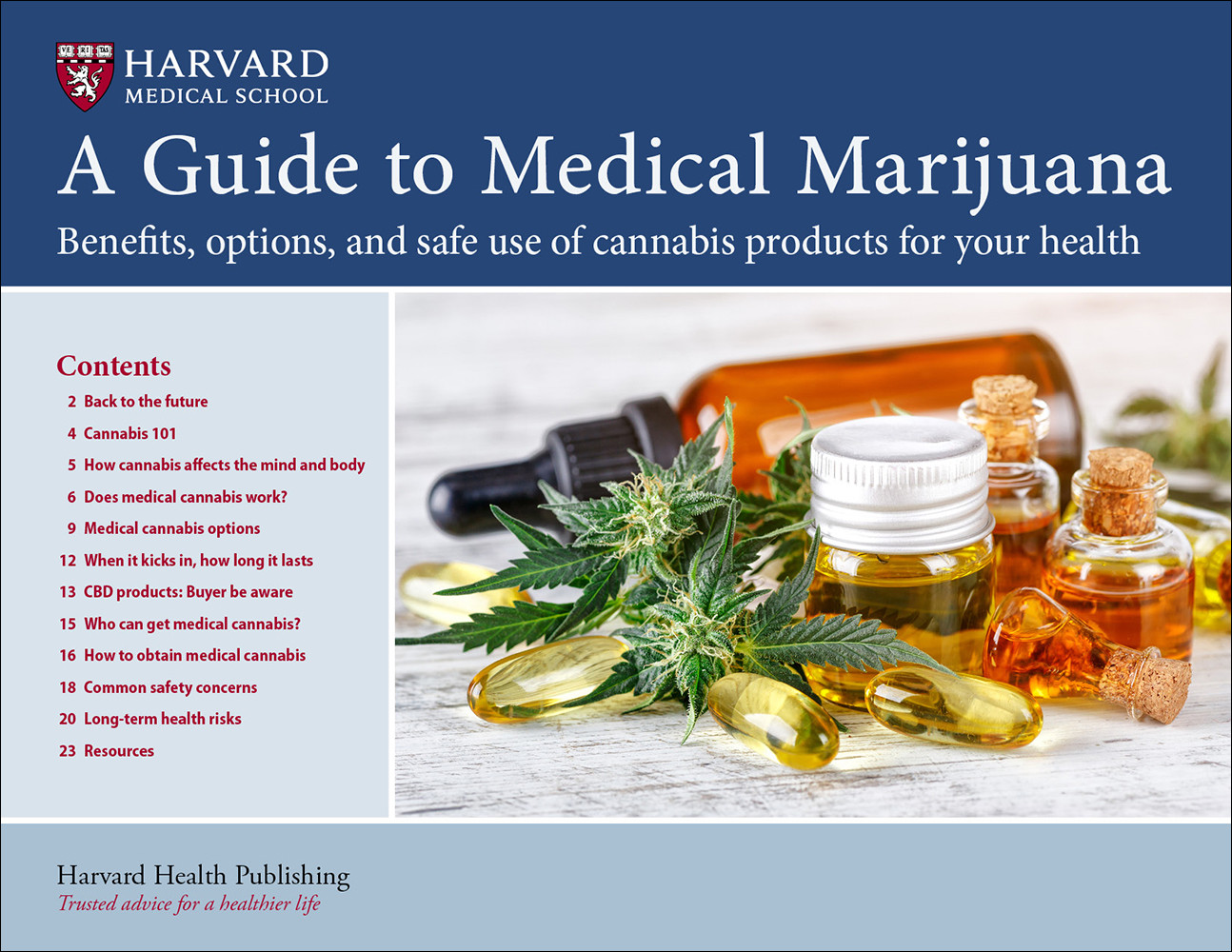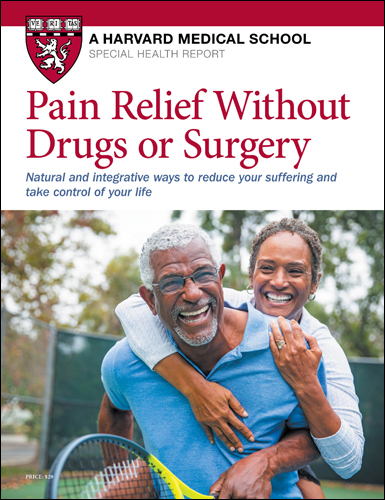
5 timeless habits for better health

What are the symptoms of prostate cancer?

Is your breakfast cereal healthy?

When pain signals an emergency: Symptoms you should never ignore

Does exercise give you energy?

Acupuncture for pain relief: How it works and what to expect

How to avoid jet lag: Tips for staying alert when you travel

Biofeedback therapy: How it works and how it can help relieve pain

Best vitamins and minerals for energy

Should you take probiotics with antibiotics?


Medical Marijuana: Facts about cannabis, THC, and CBD
Medical cannabis is available in more delivery methods than ever before, such as gummy bears, dried flowers, pills, lotions, drops and a variety of edibles, but what exactly does it do?
With so much misinformation and junk-science on the internet, it is important to get solid facts from doctors and scientists you can trust before deciding if medical marijuana could help you.
Now leading experts at Harvard Medical School are here to help you separate fact from frightening fiction about medical cannabis so you can make informed decisions. There are benefits for some conditions, and no benefit for others. And, while there is a lot of positive talk about cannabis, there are risks—especially if you’re over 55.
Other Product Information
Does cannabis really offer the health benefits you hear so much about?
Or, Is The Hype More than the Hope?
Learn the Facts With The Expert Information On Every Page Of Medical Marijuana: Facts about cannabis, THC, and CBD
What You Need To Know From The Most Trusted Source In Health Information—Harvard Health Publishing
Does medical cannabis work? If you ask people who use it, many will enthusiastically report that it does. However, the evidence remains somewhat fragmented, incomplete, and uncertain. Additional research is underway, but there remains many unanswered questions.
But what are the facts? What are the proven benefits, and what are the risks? What’s the right dose, and how do you determine the quality of what you are taking? Do the products you might use even contain the ingredients they promise?
Don’t take chances with your health. Get accurate answers straight from the experts at Harvard Medical School in Medical Marijuana, an all-new report you can download right now.
- Pain? Studies show that medical marijuana can help ease persistent pain.
- Trouble Sleeping? There is moderate evidence that medical marijuana may help disturbed sleep associated with sleep apnea, fibromyalgia, chronic pain, and MS.
- Nausea and Vomiting? There are FDA-approved cannabinoid-based prescription drugs that can help with side-effects from chemotherapy when other medications don’t.
Download the report right now and get the facts and dispel the rumors! Learn the history and science behind this ancient plant and be well-prepared for a conversation with your doctor.
Prepared by the editors of Harvard Health Publishing in conjunction with Staci Gruber, PhD, Associate Professor of Psychiatry, Harvard Medical School and Director, Cognitive and Clinical Neuroimaging Core, and Director, Marijuana Investigations for Neuroscientific Discovery Program, McLean Hospital. (2024)
About Harvard Medical School Guides
Harvard Medical School Guides delivers compact, practical information on important health concerns. These publications are smaller in scope than our Special Health Reports, but they are written in the same clear, easy-to-understand language, and they provide the authoritative health advice you expect from Harvard Health Publishing.
Prepared by the editors of Harvard Health Publishing in consultation Staci Gruber, PhD Associate Professor of Psychiatry, Harvard Medical School Director, Cognitive and Clinical Neuroimaging Core, and Director, Marijuana Investigations for Neuroscientific Discovery (MIND) Program, McLean Hospital. 23 pages (2023)
How to obtain medical cannabis
If you want to get permission to legally use medical cannabis under a medical marijuana program, it’s important to fully understand the terms of your state’s medical marijuana law or program. Whether you can access medical cannabis depends on what state you live in. The following information applies specifically to cannabis products obtained under state medical marijuana programs—not to hemp-derived (mostly CBD) products for sale online and in the general marketplace.
Comprehensive programs provide patients with legal protections, practical access to a variety of cannabis preparations, a variety of ways to administer cannabis products, and ongoing, public access to the program.
An additional 15 states have restricted, noncomprehensive programs. Many of these provide access to only low-THC, high-CBD cannabis preparations— for example, to treat seizures.
The National Conference of State Legislatures website maintains a list of state programs with links to the text of the laws themselves. It’s a good place to start educating yourself about medical marijuana laws: www.ncsl.org/ research/health/state-medical-marijuana-laws.aspx. Your state, if it has a medical marijuana law, may also have online information about the program. Following are some of the fundamentals of state medical cannabis laws and programs.
Certification
Doctors cannot “prescribe” cannabinoid-based products unless they are in the form of one of the four FDA-approved pharmaceuticals. Instead, a health care provider “certifies” you to legally obtain and use medical cannabis. In some states, this may be called getting authorization or a recommendation.
The person providing certification is usually a physician (M.D. or D.O.), who confirms that you have a qualifying condition—a health problem with symptoms that could, hypothetically, be alleviated by cannabis. You’ll probably need it in writing, but some states allow oral consent.
Other health care professionals who can certify in certain states include physician assistants, nurse practitioners, registered nurses, naturopaths, dentists, podiatrists, and nurse midwives. Some states also require a registered pharmacist to be at dispensaries to advise people on the appropriate cannabis preparation and delivery method for their qualifying conditions. You don’t necessarily have to get certified by your usual doctor. In fact, most primary care providers in the United States don’t offer this service. But you can also find physicians who specialize in providing access to medical cannabis. You may see them referred to as “marijuana doctors” or “medical marijuana clinics.”
Registration
States require you to be on an official list, or registry, as a certified medical cannabis user. You may be required to obtain a physical card. Or you may need to be added to a database that medical cannabis providers can check. You will probably pay a fee for registration, typically good for one year.
Caregiver access
Medical cannabis laws allow you to designate a primary caregiver. This person is an adult who acts as an intermediary to buy, deliver, and/or administer medical cannabis to certified patients. A caregiver can also grow the cannabis, or help the patient to do it. It can be a family member or friend, but is often a home health care provider or other medical professional.
Where you buy it
Some states allow privately run, for-profit cannabis dispensaries— brick-and-mortar facilities where a certified patient or caretaker can enter and buy products. You generally need to prove that you are certified to enter.
In other states, only nonprofit dispensaries are permitted. Or the state may allow people to obtain medical cannabis from nonprofit “collectives” in which multiple patients band together to produce and provide cannabis to themselves.
Some states allow patients to cultivate a limited number of cannabis plants for medical use.
State laws vary on how much cannabis you can possess at any given time. They may specify either actual ounces of products, an amount to last a certain period (often one month), or a limited number of living plants in cultivation.
Hemp-based products
You do not need to obtain certification to buy and use legally available hemp-based products containing CBD. But always keep in mind that these products are not (yet) regulated for purity and potency. In contrast, most states require that medical cannabis products sold in dispensaries undergo testing.
- Back to the future
- Cannabis 101
- How cannabis affects the mind and body
- Does medical cannabis work?
- Medical cannabis options
- When it starts, how long it lasts
- The CBD craze: Buyer beware
- Who can get medical cannabis?
- How to obtain medical cannabis
- Common safety concerns
- Long-term health risks
- Resources
You might also be interested in…

Pain Relief Without Drugs or Surgery
Pain relief takes many forms. This Special Health Report, Pain Relief Without Drugs or Surgery, looks beyond the standard approaches of drugs and surgery and explores alternate pain-relief strategies, from acupuncture and mind-body therapies to spinal manipulation, physical and occupational therapies, herbal remedies, mindfulness meditation, and music therapy among others. The report also provides specific treatments for 10 common pain conditions.

5 timeless habits for better health

What are the symptoms of prostate cancer?

Is your breakfast cereal healthy?

When pain signals an emergency: Symptoms you should never ignore

Does exercise give you energy?

Acupuncture for pain relief: How it works and what to expect

How to avoid jet lag: Tips for staying alert when you travel

Biofeedback therapy: How it works and how it can help relieve pain

Best vitamins and minerals for energy

Should you take probiotics with antibiotics?
Free Healthbeat Signup
Get the latest in health news delivered to your inbox!
Sign Up